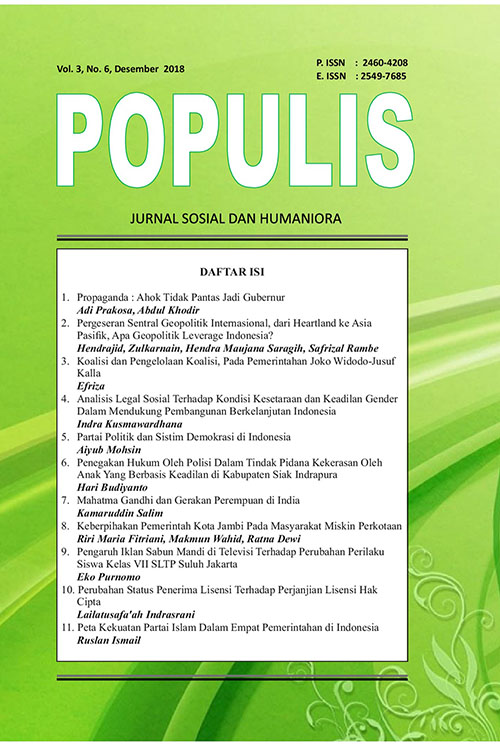KOALISI DAN PENGELOLAAN KOALISI, PADA PEMERINTAHAN JOKO WIDODO-JUSUF KALLA
DOI:
https://doi.org/10.47313/pjsh.v3i2.470Abstrak
This paper discusses the relationship between the President and the House of Representatives and the coalition government based on the three years of President Joko Widodo (Jokowi), who was trapped in inter-institutional competition as a consequence of a mixture of presidential and multi-party systems.Initialy, President Jokowi has the desire to realize a coalition based on ideology and the same program (consensus coalition) between political parties, but the reality, it is difficult to make it happen in government, finally President Jokowi re-elected a coalition of “all parties”. Using some of the basics of Scott Mainwaring and David Altman about presidential and multiparty combination systems and coalitions in presidential systems, complemented by several Coalitions. Then, complete the results of Otto Kirchheimer on Catch All Party, to outline the transformation of the party in this modern era. Accompanied by discussions on political parties in Indonesia, based on Yasraf Amir Piliang's description of political nomadism. Based on the facts and outcomes, a combination of presidential and multiparty systems and the government's management of government by President Jokowi, which manages a "fat" coalition with accommodative leadership and transactional performances. Matters relating to the harmonious relationship between the President and the House of Representatives with the consequence that the President is committed to realizing an unconditional coalition and not for the power-seats. Coalition management can be done because the choice of the party that develops as a supporter of the government is also based not only on the need for political imagery in order to encourage electoral in the political market, but also in the spirit of the party. Keywords: Presidential System, Coalition Government, the President-Parliament Relations, Leadership JokowiReferensi
Buku:
Adam, Rainer, (2010), Masa Depan Ada di Tengah: Toolbox Manajemen Koalisi, Jakarta: Friedrich Naumann Stiftung, 2010.
Amal, Ichlasul, (1996), Teori-Teori Mutakhir Partai Politik (edisi revisi), Yogyakarta: Tiara Wacana Yogya.
Andriyan, Dody Nur, (2012), Hukum Tata Negara dan Sistem Politik: Kombinasi Presidensial dengan Multipartai di Indonesia, Yogyakarta: Deepublish.
Denzin, Norman K., & Lincoln, Yvonna S., (2009), Handbook of Qualitative Research, terjemahan Dariyatno, at.all, Yogyakarta: Pustaka Pelajar.
Hanan, Djayadi, (2014), Menakar Presidensialisme Multipartai Di Indonesia: Upaya Mencari Format Demokrasi yang Stabil dan Dinamis dalam Konteks Indonesia, Bandung: Mizan.
Haris, Syamsuddin, (2014), Praktik Parlementer Demokrasi Presidensial Indonesia, Yogyakarta: Andi Offset.
Herdiansah, Ari Ganjar, (2015), Paradoks Koalisi Tanpa Syarat: Suatu Tinjauan dari Perspektif Sosiologi Politik, Jakarta: RajaGrafindo Persada.
Huda, Ni’matul, dan Nasef, M. Imam, (2017), Penataan Demokrasi dan Pemilu Di Indonesia Pasca Reformasi, Jakarta: Kencana.
Indrayana, Denny, (2011), Indonesia Opitimis, Jakarta: Bhuana Ilmu Populer.
Ishiyama, Jhon T., & Breuning, Marijke, ed., (2013), Ilmu Politik Dalam Paradigma Abad Ke-21 (jilid 1), Jakarta: Kencana.
Nurhasim, Moch., & Nusa Bhakti, Ikrar, ed., (2009), Sistem Presidensial dan Sosok Presiden Ideal, Yogyakarta: Pustaka Pelajar.
Piliang, Yasraf Amir, (2005), Transpolitika: Dinamika Politik di Dalam Era Virtualitas, Yogyakarta: Jalasutra.
Riwanto, Agus, (2016), Hukum Partai Politik dan Hukum Pemilu di Indonesia: Pengaruhnya Terhadap Penyelenggaraan Pemilu Berkualitas dan Sistem Pemerintahan Presidensial Efektif, Yogyakarta: Thafa Media, 2016.
---------, (2018), Desain Sistem Pemerintahan Antikorupsi: Konsep Pencegahan Korupsi Politik dalam Sistem Pemerintahan, Partai Politik dan Pemilu, Malang: Setara Press.
S. Shinta, Muhammad Sabri, (2012), Presiden Tersandera: Melihat Dampak Kombinasi Sistem Presidensial-Multipartai dalam Pemerintahan SBY-Boediono, Jakarta: RM Books.
Jurnal, Tulisan/Berita Surat Kabar:
Djayadi Hanan, Setahun Pemerintahan Joko Widodo Tiga Tantangan Jokowi, Koran Tempo, 27 Oktober 2015.
Istman Musaharun dan Dias Prasongko, Jokowi Belum Berniat Depak PAN, Koran Tempo, 2 November 2017.
Koalisi Partai Politik Pendukung Pemerintah: KIH Ganti Nama Jadi P4, Warta Kota, 14 November 2015.
Agustino, Leo, Satu Tahun Pemerintahan Jokowi: Transaksional dan Transformasional, dalam Analisis CSIS, Vol. 44, No. 4, 2015.
Dokumen Resmi:
Indrawati, Sri Mulyani, Projo Public Lecture, makalah disajikan dalam Projo Public Lecture, Jakarta, 22 November 2017.
Internet (artikel dalam jurnal online)
Altman, David, (2000), The Politics of Coalition Formation and Survival in Multiparty Presidential Democracies: The Case of Uruguay 1989-1999, Party Politics, Vol. 6 No. 3, (http://www.icp.uc.cl/daltman/index_archivos/Altman-2000-Party%20 Politics%206%20%283%29% 20259-283.pdf, diakses 15 Februari 2018).
Mainwaring, Scott, (1993), Presidentialism, Multiparty System, and Democracy: The Difficult Combination, Comparative Political Studies, Vol. 26 No. 2, hlm. 220-222, (https://www.researchgate.net/publication/258130109_The_Presidentialism_ Multipartism_and_Democracy_The_Difficult_Combination, diakses 15 Februari 2018).
Wawancara:
Arbi Sanit, Pengamat Politik dan mantan Dosen UI, 8 Januari 2016, Jakarta.
Firman Noor, Peneliti di Pusat Penelitian Politik Lembaga Ilmu Pengetahuan Indonesia (P2P LIPI), 22 Desember 2015, Jakarta.
Syamsuddin Haris, ahli politik dan peneliti Pusat Penelitian Politik Lembaga Ilmu Pengetahuan Indonesia (P2P LIPI), 28 Desember 2015, Jakarta.
##submission.downloads##
Diterbitkan
Terbitan
Bagian
Lisensi
Pemberitahuan Hak Cipta
- Hak publikasi atas semua materi informasi yang tercantum dalam situs jurnal ini dipegang oleh dewan redaksi/editor dengan sepengetahuan penulis. Pengelola Jurnal akan menjunjung tinggi hak moral penulis.
- Aspek legal formal terhadap akses setiap informasi dan artikel yang tercantum dalam situs jurnal ini mengacu pada ketentuan lisensi Creative Commons Atribusi-NonCommercial-No Derivative (CC BY-NC-ND), yang berarti bahwa hanya dengan izin penulis, informasi dan artikel Jurnal BACA dapat didistribusikan ke pihak lain dengan tanpa merubah bentuk aslinya untuk tujuan non-komersial.
- Setiap terbitan Populis Jurnal Sosial dan Humaniora, baik cetak maupun elektronik, bersifat open access untuk tujuan pendidikan, penelitian, dan perpustakaan. Di luar tujuan tersebut, penerbit atau pengelola jurnal tidak bertanggung jawab atas terjadinya pelanggaran hak cipta yang dilakukan oleh pembaca atau pengakses.




